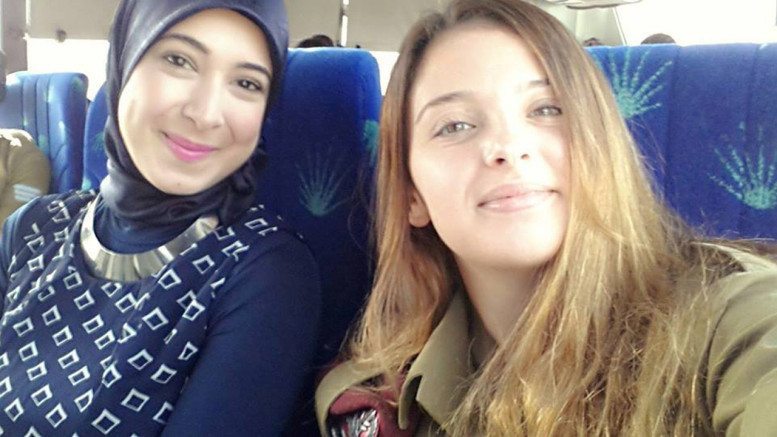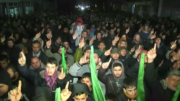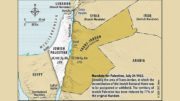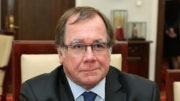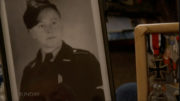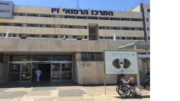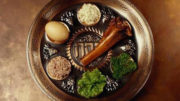What it is necessary to understand is that the movement known as Zionism which, beginning in the nineteenth century, climaxed in the setting up of the state of Israel in 1947, was a response to this long history of persecution. The so-called Holocaust came as the horrific confirmation of the needs which the Zionists had long maintained for a national identity and habitation for the Jewish people. Other localities were considered, but Palestine answered the agelong nostalgia of the Jews for their ancestral homeland, where, moreover, communities of Jews had persisted, and at times flourished, since Biblical times: Tiberias, Hebron and Safed, as well as Jerusalem, were centres of rabbinical learning.”Anna Rist (1994) Zionism, New Blackfriars
I grew up in South Africa at the height of the Apartheid regime. As a child I accepted that there were two benches to sit on – one for whites and one for non-whites; that there were two entrances to the post office and the banks – one for whites and one non-whites; that only whites could work in shops; that the street sweepers were always black; that if I walked on the pavement, the non-whites had to walk in the street; that school was free for me but the non-whites had to pay; that universities were the exclusive preserve of the white minority, while non-whites were relegated to a small number of lesser universities; that there were white and non-white beaches, buses, trains and hospitals.
I remember that if you travelled in a car, your non-white servant had to travel in the back, lest it be construed that you were in a relationship in contravention of the Immorality Act. I remember not being able to hug my black nanny in the street for fear of her being arrested under the laws governing racial segregation.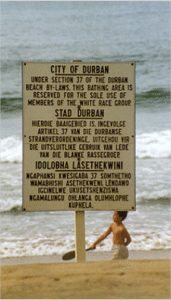
Although I was not a political activist I struggled with these laws as I grew up. The turning point for me was an incident in a Police station when, in my attempt to register a black maid, I was told she was from the wrong tribe and had to leave the area in 24 hours. Before the stamp came down on her pass I grabbed it and ran. I watched as the Police vans came around at night to round up those who had no valid passes. I couldn’t watch anymore and I left.
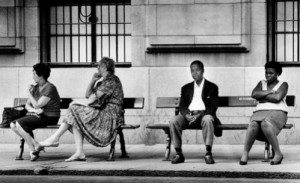
A bus stop in Apartheid South Africa
I tell this to provide a picture of who I am. I believe in equality, in human rights. I am a member of Amnesty International, of Greenpeace, and I am a Zionist. Now some people tell me that being a Zionist makes me a racist; that I am upholding an Apartheid regime, and I ask why.
Why are all the most abhorrent crimes of humanity placed at the feet of the Jews? Why do people question the right of Israel to exist, the right of Jewish people to a homeland, when they have no such qualms about the division of India into India and Pakistan? Somehow the guilt of the world has been placed on the shoulders of the Jewish state. Why do I feel like I have to abandon my liberal ideology in order to support the rights of Jewish people to a homeland?
Zionism grew out of centuries of persecution when it became clear that Jews were always going to be considered “other” in any country in which they lived. A case in point being my parents’ history – my mother was born in the Simferopol area of the Crimea, which was part of the Pale, the term given to a region of Imperial Russia in which permanent residency by Jews was allowed and beyond which it was generally prohibited. Even within this region Jews were excluded from living in a number of cities, while a limited number of categories of Jews were allowed to live outside it. World War I, the February and October Revolutions, and the Russian Civil War created social disruption and the rise of anti-Semitism.
The largest-scale European massacres of Jews occurred in 1918-1922, with 150,000 Jews being killed in the pogroms – 125,000 of them in Ukraine and 25,000 in Belarus. The Russian Civil War pogroms shocked world Jewry and rallied many Jews to the Red Army and the Soviet regime, and also strengthened the desire for the creation of a homeland for the Jewish people.
My mother was born in 1919 when the Soviet government arrested many rabbis; seized Jewish properties, including synagogues; and dissolved many Jewish communities. My grandfather’s factory was one of those seized and he fled with his family to Lithuania. Once a relatively wealthy owner of a shoe factory, making boots for the Russian army, he now struggled to eke out a living as a shoemaker. Unable to provide for his family he left to find a better life in South Africa. Though his intention was to send for my grandmother and their children as soon as he was able, it was five years until he could to do this.
My mother spoke of pogroms, of how Jews were treated in the Russian army – getting the toughest treatment and never being allowed to forget who they were. There was never a time when my parents considered themselves Russian; my mother was Jewish, she was Yiddish. This was the language spoken at home and there was never even a thought that our ancestry made us Russian.
The only place where Jews could feel accepted was in the biblical land of Israel, which had been central to Jewish yearning for centuries. The prayer, “Next year in Jerusalem”, echoed through the ages as Jews everywhere expressed a desire to return to their ancestral land from which they had been expelled so many centuries earlier. We grew up knowing that although we may live elsewhere, ultimately, regardless of our loyalty and love of the country of our birth, Israel was and is our spiritual home. Zionism is a core part of our identity and the existence of Israel represented the first time that Jews could hold their head up and not be labelled as “other”.
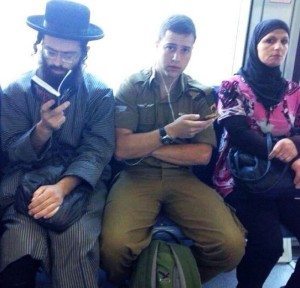
A bus in Israel
I am so saddened to hear the accusation of Apartheid, a word so abhorrent to me, now thrown carelessly at a land I consider my spiritual home. I, like many other South Africans who carried deep scars from living in such a repressive regime, decided to look closely at what was happening within Israel to understand why it was being tarnished with this accusation.
What I found was that, unlike South Africa, Arab citizens of Israel could vote (and be voted into power), go to University, sit next to Jewish citizens on buses, go to the same hospitals, serve in government, and serve in the army. In short there was nowhere that I found a similarity to what I experienced in South Africa. Jews, Arabs, Christians, and all people were treated equally by law and in practice. The criterion for inclusion in all aspects of civilian life is that you are a citizen of Israel.
Of course Israel isn’t perfect, despite its many and wondrous achievements since 1948. However, for critics it’s not enough to denounce its ills and errors: instead, they exaggerate and distort and present an ugly caricature far distant from reality…I believe those campaigners want Israel declared an apartheid state so it becomes a pariah, open to the world’s severest sanctions. Many want not just an end to the occupation but an end to Israel itself.”Benjamin Pogrund (ex South African Israeli Author)
It is so convenient to have a hateful political label to attach to a country whose existence you oppose. Some of the most vocal opponents of Israel study in Israeli universities. Omar Barghouti, a Palestinian activist, who lobbies for worldwide economic, cultural and academic boycott of Israel, is currently studying at Tel Aviv University. In any of Israel’s neighbouring states he would be arrested as a political dissident. It is only because Israel is a democracy that people can so openly criticise a country that allows freedom of speech.
If you dared to criticise the regime in South Africa you could have been imprisoned without trial. You faced torture and often did not survive to continue your struggle against the regime. Apartheid-type laws and stifling of free speech exist in the lands around Israel – political dissidents have been arrested in Egypt, Kuwait, and Jordan; Jews are not allowed to buy land controlled by the Palestinian Authority; no Jews live in Gaza since Israel unilaterally withdrew from there and disbanded all settlements; bloggers who challenge the government are sentenced to 1,000 lashes in Saudi Arabia; Christians are being driven from the Middle East, other than Israel or slaughtered. In Iran, which has the largest remaining Jewish community in the Middle East apart from Israel, Jews are treated as second class citizens and are treated differently under Sharia law from Muslims.
So how do we explain this obsessive focus on Israel, while civil rights abuses in so many countries around the globe and particularly in the Middle East, are condoned? Perhaps it is because those who wish to blame Jews for all evil in the world have twisted facts to fit their agenda and now focus on Israel and Zionists. As women’s rights activist, Ayaan Hirsi Ali, said, following a screening of Crossing the Line 2: The New Face of Anti-Semitism on Campus:
It is appalling that only seventy years from the Holocaust, crowds in Europe chant “Hamas, Hamas, Jews to the gas.” It is even more appalling that 10,000 soldiers in Paris are needed to protect Jewish sites. That is the continent that promised never again. The men and women who were in the concentration camps, who are tattooed, some are still here. And it is happening again.”Ayaan Hirsi Ali
The accusations leveled against Israel of human rights’ violations comparable to Apartheid, do not withstand scrutiny. The claims should be examined in the light of what Apartheid really was and then discredited. A few years back I sat in the home of the person who had been a maid to our family. This was the first time that I, a white person, had been allowed into Soweto, as this was denied to whites during the Apartheid years. The son of this woman, whose education was paid for by our family, was now a member of the South African Government. He had spent years in exile, after he had to cease studying at Fort Hare (an exclusively Black university) where he was enrolled in a medical degree, for fear of being arrested for no greater crime than being a member of the banned African National Congress.
Over the years, this man whose mother’s home I was now visiting, had risen in the ranks of the ANC, but continued to remain in exile from 1976 to 1994. His brother, who had supported him in exile did not fare as well – he had been arrested and tortured on many occasions and still bore the scars of these incarcerations. This is what the world of Apartheid was like. These are some of the hardships that the people living under this system endured.
Compare this to the situation in Israel, where Israeli Arabs make up one in ten of all university graduates and where they hold 16 seats in the Knesset (Israeli parliament). The average length of education of the largely peasant Arabs of 1948 has increased from 2 years then to 11 years now. Two-thirds of Israeli Arabs graduate from high school and one-third pass their college entrance exam. This educational level is twice that of China and three times that of India.
So please do not compare Israel to what was Apartheid South Africa. I lived in South Africa during Apartheid and I’ve experienced Israel. This accusation is baseless and I remain proud to call myself both a New Zealander and a Zionist.
Those who know what real apartheid is, as I know, know that there is nothing in Israel that looks like apartheid“Kenneth Meshoe (South African Member of Parliament)
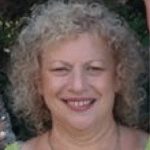
Shirley-Anne Hodgson is an Auckland based audiologist who left South Africa at the age of 20. She believes in equality and human rights.
